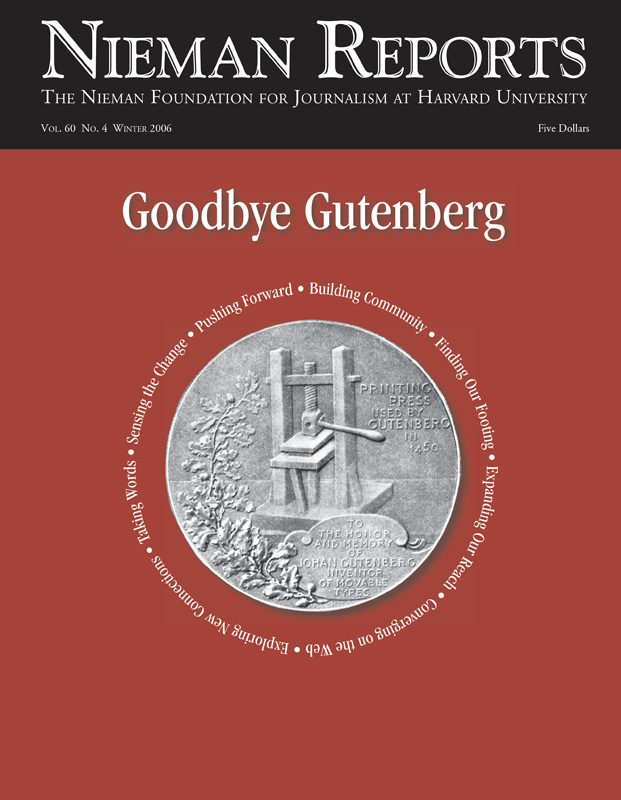
In creating craigslist—an online community of shared information, services, RELATED WEB LINK
craigslist
– craigslist.orgactivities and ideas that has more than five billion page views each month—and doing customer service, my colleagues and I developed a reasonable sense of what the deal is with how people want to use the Web. After being invited by journalists into discussions about new media, I've come away with a few clues about how what I deal with online might help them as the news industry undergoes massive change in the digital era. And now I offer my outsider's take on how my experience might have some meaning to those engaged in journalism.
Craigslist is a place where people can give each other a break regarding everyday needs, such as finding a place to live or getting a job. From one perspective, it's basically a classified ad site. Penelope Green, writing in The New York Times, referred to it as resembling "a marketplace on the ancient model—chaotic, unruly, and vividly human."
Somehow, the craigslist community—its users and company—has constructed a culture of trust. Basically people feel they should treat others as they want to be treated. Where we start from on craigslist is in trusting people; then we give those who come into our community real power to self-police. We do light management but, mostly, we stay out of the way and let people set the tone of the site. Somehow this approach works.
Reinforced for us is the sense that folks on the Internet are overwhelmingly trustworthy. But as in daily life, bad guys exist, and a few of them surface occasionally in our online neighborhood. We've found them to be a tiny but loud minority, an experience echoed by every successful Web site I've heard about. There are "spamvertisers" and scammers, and dealing with them involves a balance between passionate desire to pursue these bad guys and an interest in preserving the rights of the accused. On occasion these Internet bad guys push us to provide the cops with a quick lesson in Internet forensics, privacy principles, and law. (Sometimes this involves asking for help from the Electronic Frontier Foundation, which does a lot of heavy lifting.)
Disinformation on the Web
Beginning early in 2004, we noticed a surge of Web-based efforts in our online forums to smear political candidates, such as John McCain. What was most disturbing is that the folks doing this would spamvertise political talking points, even ones known to be fraudulent. Those who posted these notices would occasionally pretend to be different people—and post the erroneous information again. (One man posted at times as a woman.) In this way, this decentralized network of posters would keep information in circulation, and then they would virulently discuss possible fetishes of candidates in terms that were unusual even for those of us in San Francisco.
Witnessing this online behavior, I started to think a lot about disinformation campaigns not only happening on craigslist but throughout the Web. Other Web sites—Wikipedia is a well-known example—have suffered from this problem. Of course, whispered rumors and smear campaigns in politics aren't new; they've been used since elections in ancient Greece. In late September, the policy director in the congressional office of Representative Charles Bass resigned after it was disclosed that he posed as a supporter of his boss's opponent in blog messages; the intent of what he posted was to convince people that the race was not competitive. (Bloggers traced his postings to his system.)
Nor is this phenomenon solely political. People try to use sites like ours to attack commercial competitors, often by spreading rumors; and posters recommend their own services while not forthrightly identifying themselves.
What's troubled me is that disinformation campaigns and information warfare appear to be amplified by the Internet. When the scent of bad information can taint a relationship built on trust, this poses problems for the Web. This is especially problematic for news providers and news consumers since damage done to trust can be very costly on many levels.
After being invited to join some conversations involving journalists who were thinking about "new media," I started thinking a lot more about the role journalists play in a vigorous democracy and about the Internet as a distribution medium. (An early reaction I had is that at least on the business side of journalism people seemed to be exaggerating the effect craigslist was having on newspaper revenue.) But for me, sitting at a table surrounded by journalists offered an opportunity to absorb what it is reporters and editors do and why what they do matters to someone like me. What they wanted me to think about with them was how to do this in a new media that they figured I understood.
What my experiences added up to was one major piece of advice: The central requirement for news organizations has to be trust. Which version of a story can be trusted? As a consumer of news, this core issue of how to establish—and maintain—trust can be frustrating. For example, when I watch interviews and can tell when a reporter knows someone is lying, I wonder why they don't challenge the veracity of what's been said. This happens in what I consider to be clear-cut cases in which I, the viewer, know the reporter knows that he is being lied to. The only news source that shares with viewers the video that shows this is "The Daily Show." Often Jon Stewart will show a person saying one thing, then contradicting what he just said; similar clips are rarely, if ever, shown on broadcast news. Some reporters have told me of times when they knew someone was lying, but they couldn't report this.
Learning From Journalists
Meeting with journalists—including leaders in new media such as Jeff Jarvis, Dan Gillmor, and Jay Rosen—I've had what amounts to a tutorial about journalism. In his essay entitled "The End of Objectivity," Gillmor describes reasons why reporters set out to tell both sides of a story, even in the face of overwhelming evidence that one side is likely to be wrong. His conclusion: fairness, rather than objectivity, ought to be the goal, and I agree. In listening to them talk about how journalism works, their words reinforced in me a lesson from when I read "The Boys on the Bus," a book about coverage of the 1972 presidential campaign, when I realized that "news" is determined by group thinking among editors who decide what news is and dismiss what's considered by them to be crazy thinking.
While mainstream journalism has its faults, today's excitement about the potential of "citizen journalism" fails, too often, to take into account the ethics, standards and skills of journalism—reporting, writing, editing, fact checking, and publication—practiced usually in this order. In most of the citizen journalism I've observed, fact checking and editing happens after publication, if at all. However, a strength of good citizen journalism is when the correspondent has the courage to speak truthfully even in the face of powerful opposition. In some respects, these 21st century Web correspondents (like some of the best journalists) are following in the footsteps of Martin Luther, John Locke, and Thomas Paine, whose words led to large scale, effective change.
From where I sit, the highest priority right now seems to be finding ways to RELATED WEB LINK
Congresspedia
– www.sourcewatch.orgencourage the convergence of what's now being done by journalists with what can be done when citizens add their voices to the mix. And this includes journalism's essential role of being a watchdog on government and other important social and economic institutions. In that regard, some interesting things are happening on the Web. For example, the Sunlight Foundation is behind Congresspedia, which is like Wikipedia for Congress, an idea also being pushed by the Center for Media and Democracy, best known for exposing fake news in the form of video news reports.
Its Web site is overseen by an editor "to help ensure fairness and accuracy," and tools are provided to help people investigate congressional "corruption," whether it involves illegal or unethical behavior by those who serve or in legislators' efforts to earmark funding to special projects. For example, earlier this year on the site an investigation was pursued into whether a home-district "earmark" by Speaker J. Dennis Hastert resulted in him making a two million dollar profit on the sale of land he owned. A similar effort is evident at Porkbusters, where a Weblog that highlights wasteful spending encourages constituents to track what's happening in their state and congressional district and post what they discover; on this site, too, a secret senatorial hold on a bill, which would put federal contract data online, was revealed.
There are other notable efforts of merging what is best about journalism and the Web (and with which I've been involved):
- Jay Rosen, who writes the PressThink blog and teaches journalism at New York University, is seeking a new model of investigative journalism at NewAssignment.net.
- Jeff Jarvis, who writes the BuzzMachine blog, is working with Upendra Shardanand, a former Time Warner executive and cofounder of Firefly Network, to build a new kind of news aggregator site, daylife.com
- Dan Gillmor runs the Center for Citizen Media, where among other efforts he is trying to figure out what's happening with citizen journalism.
RELATED WEB LINKS
Porkbusters
– porkbusters.org
PressThink
– journalism.nyu.edu
BuzzMachine
– buzzmachine.com
Center for Citizen Media
– www.citmedia.org
The Patriot Project
– patriotproject.comFinally, there's one effort that captures much of my concern and hope for the future of news media. There's an investigative effort at The Patriot Project that is focused on disinformation campaigns that attack military heroes, such as the one used against Representative John Murtha, a decorated war veteran whose strong opposition to the Iraq War has made him a target of smears. On this site, the attacks are tracked back to public relations firms that act as fronts for people who hold elective office. Is this site trustworthy? If feels so, but I really do want what I find there to be fact checked.
We all wonder whom and what to trust and want to know how information is verified. And we can only hope that people have opportunities, as I've had, to really think about how a free press preserves democracy. I'm hopeful that what I've learned about trust in our online community can help journalism achieve this in their digital enterprises. I'm here to help, and I'll try not to get in the way.
Craig Newmark is customer service representative and founder of craigslist (www.craigslist.org) and is involved in a consulting role with NewAssignment.net, citmedia.org, and daylife.com, currently in alpha. Newmark adds that he has "a microscopic financial interest" in daylife.


